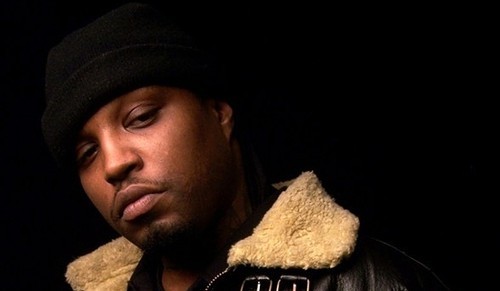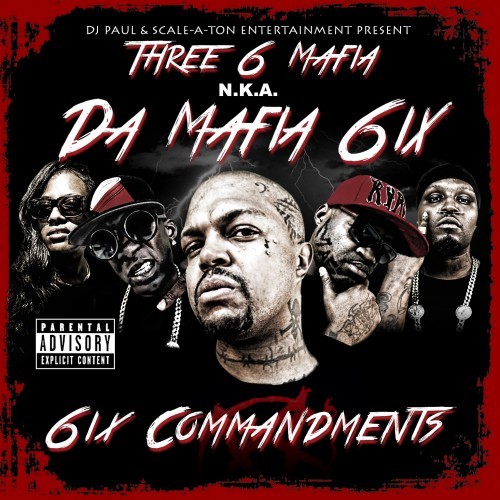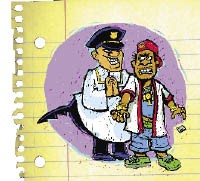In the ’60s, Martin Luther King Jr.’s battle cry was “Free at last”; that same decade, Bob Dylan famously proclaimed, “I shall be released.” For Memphis rapper Patrick “Project Pat” Houston, who just wrapped up three years in a federal penitentiary on a concealed-weapons charge, the words are just as potent and, perhaps, even more urgent: “Tell your old man I ain’t going back to jail,” he states on the opening track of Crook By Da Book: The Fed Story, his long-awaited, first post-prison release.
Listen to Crook By Da Book and you’ll quickly realize that Project Pat is hardly reformed — a self-described “North Memphis monster,” he’s as full of braggadocio as ever, writing songs called “Cocaine” and sagely rapping urban nursery rhymes like “This nigga got popped/With a whole lotta bullets in his head, in his head” — yet his newfound perspective impacts his songwriting.
Although “Purple,” with Beanie Sigel, is just an update on Three 6 Mafia’s “Sippin’ on Some Syrup,” “Raised in the Projects” is as celebratory as it is reflective, detailing Pat’s Horatio Alger story as set in modern-day Memphis. “Crack a Head” and “Tell Tell Tell (Stop Snitchin’),” which features verses from Lyfe Jennings, Young Jeezy, and Mr. Bigg, further outline the code of the streets, while the cartoonish “Good Googly Moogly,” “I Like,” and “Cause I’m a Playa,” with Pimp C, reinforce his image as a sexual satyr.
Like his New Orleans counterpart, the late, great Soulja Slim, Project Pat has indubitably lived the life he sings about. With his younger brother, Three 6 Mafia co-founder Jordan “Juicy J” Houston, and two other siblings, he was raised by a single mother in a North Memphis housing project where shootings and drug deals were just part of the landscape. Before he celebrated his 13th birthday, he was pulling capers; by the release date of his first album, 1999’s Ghetty Green, he’d served four years on two separate robbery charges.
But at the time of his last arrest, on January 19, 2001, when he was pulled over on New Allen Road with two pistols stored under the seat of his Cadillac Escalade, Project Pat was approaching bona-fide stardom. Ghetty Green and its follow-up, Murderers & Robbers, were valid underground hits; Mista Don’t Play: Everythangs Workin’, which was released in the interim between his arrest and his incarceration, went double-platinum, while singles like “Don’t Save Her” and “Chickenhead” made him a household name in the rap world.
Project Pat was released in late ’05, just in time to see his little brother win an Academy Award for “It’s Hard Out Here for a Pimp” and to appear in Three 6’s video for “Poppin’ My Collar.” He spent several months in a halfway house and worked at a temp agency before being deemed sufficiently rehabilitated by his parole officer. In magazines ranging from Murder Dog to DonDiva, he began formulating the groundwork for his comeback, and, as soon as he could, he reentered the recording studio.
The question is, now that Project Pat has resumed talking the talk, will he continue to walk the walk? Judging by the way they’ve parlayed their popularity into celebrity appearances on TV shows such as The Simple Life, Entourage, and Studio 60 on the Sunset Strip, Juicy J and his Three 6 compatriot DJ Paul have learned how to differentiate their roles as Hollywood entertainers from their hardcore street personas, unlike other rappers such as the foolhardy C-Murder, who was sentenced to life in prison after shooting someone in a Louisiana nightclub three years ago.
Life does have a tendency to imitate art, but according to recent interviews, Project Pat’s eager to put his past behind him — he’s just determined to do it on his own terms, not because of a court-ordered sanction. “It could all end while you’re trying to get your buck,” he soberly advises his fans on “How It Goes in the Gutta,” a grim guide to the underbelly of the city that most of us seldom see.
“Letter from Birmingham Jail” it’s not, but Crook By Da Book sure sounds good.
Where Are They Now?
An update on other onetime members of the Three 6 Mafia empire.
For many local rappers, Three 6 Mafia’s Hypnotize Minds Posse has been both a boon and the bane of their existence. Co-founder Lord Infamous recently resurfaced on local radio promoting a comeback, while former cohort Koopsta Knicca has used the local nightly news as a platform to launch business allegations against DJ Paul and Juicy J. Mr. Del, who left the group after becoming a Christian, released The Future on Holy South Records last year. Gangsta Boo, the first female member of the posse, currently splits her time between Memphis and Atlanta. Her replacement, La Chat, who made her reputation via her ferocious put-downs on Project Pat’s “Chickenhead,” dropped a new album, Bad Influence, last week. Meanwhile, Crunchy Black, the last rapper to get divorced from the group, celebrated the release of his own solo album, Crunchtime, at the Gibson Music Showcase last month.


 Greg Cravens
Greg Cravens